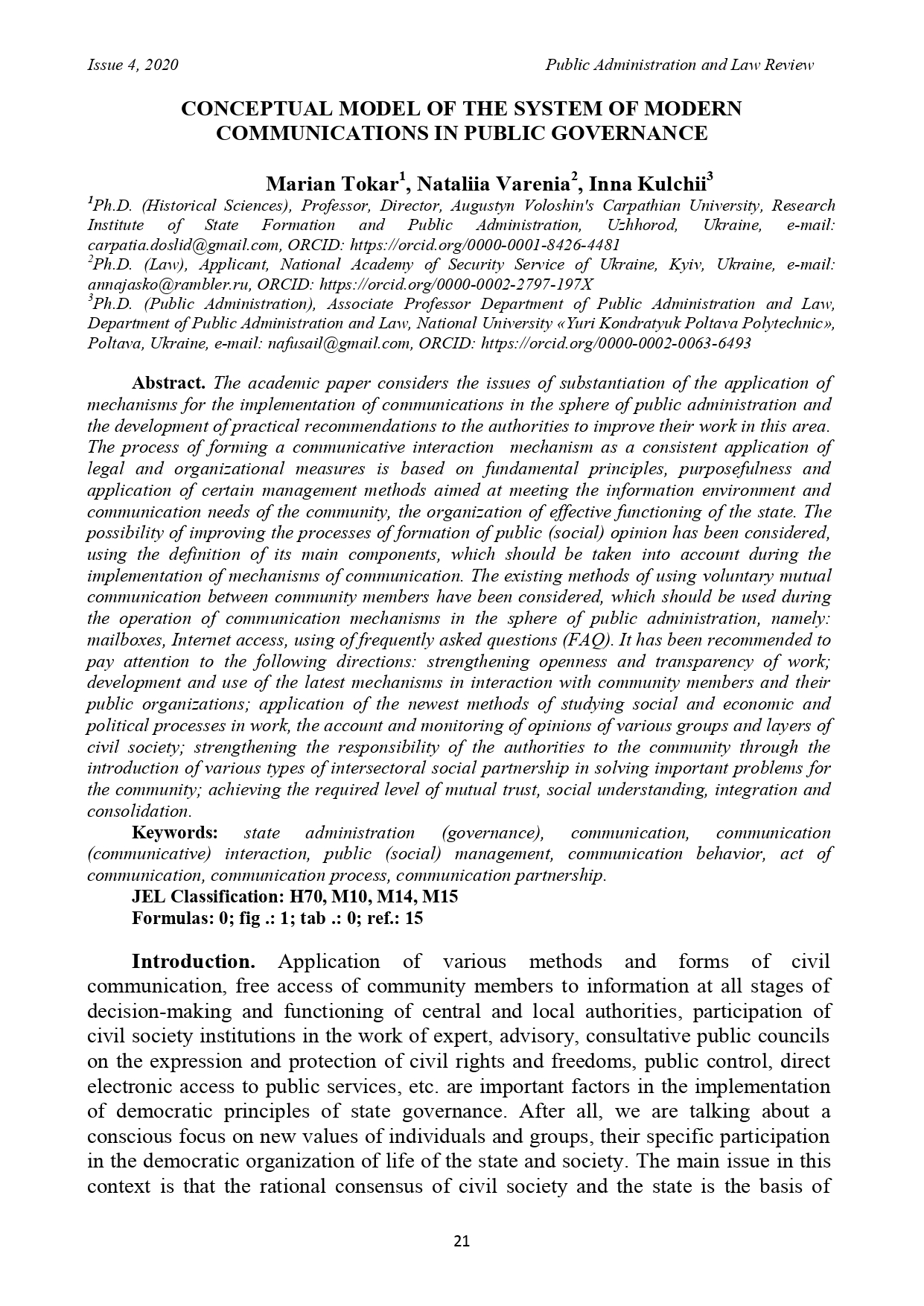CONCEPTUAL MODEL OF THE SYSTEM OF MODERN COMMUNICATIONS IN PUBLIC GOVERNANCE
DOI:
https://doi.org/10.36690/2674-5216-2020-4-21Keywords:
state administration (governance), communication, communication (communicative) interaction, public (social) management, communication behavior, act of communication, communication process, communication partnershipAbstract
The academic paper considers the issues of substantiation of the application of mechanisms for the implementation of communications in the sphere of public administration and the development of practical recommendations to the authorities to improve their work in this area. The process of forming a communicative interaction mechanism as a consistent application of legal and organizational measures is based on fundamental principles, purposefulness and application of certain management methods aimed at meeting the information environment and communication needs of the community, the organization of effective functioning of the state. The possibility of improving the processes of formation of public (social) opinion has been considered, using the definition of its main components, which should be taken into account during the implementation of mechanisms of communication. The existing methods of using voluntary mutual communication between community members have been considered, which should be used during the operation of communication mechanisms in the sphere of public administration, namely: mailboxes, Internet access, using of frequently asked questions (FAQ). It has been recommended to pay attention to the following directions: strengthening openness and transparency of work; development and use of the latest mechanisms in interaction with community members and their public organizations; application of the newest methods of studying social and economic and political processes in work, the account and monitoring of opinions of various groups and layers of civil society; strengthening the responsibility of the authorities to the community through the introduction of various types of intersectoral social partnership in solving important problems for the community; achieving the required level of mutual trust, social understanding, integration and consolidation.
Downloads
References
Azhazha, M. A.(2015), Человеческий капитал: теоретические основы и механизмы развития [Human capital: theoretical foundations and development mechanisms], Problems of spatial of socio-economic systems: economics, education, medicine [Monograph]. Opole: The Academy of Management and Administration in Opole. Р.63 - 69. [Poland]
Campbell, А., Converse, P. E., Miller. W. E., Stokes, D. E. ( 2013), The American Voter. 2nd ed. Chicago,. 407 р.
Vysotska, O. Ye. (2007), Virtualna realnist ta postratsionalna komunikatsiia v konteksti stanovlennia suspilstva postmodernu [Virtual reality and post-rational communication in the context of the formation of postmodern society], Humanitarnyi chasopys, № 4, Р. 5–11. [Ukraine]
Horovyi, V. (2010), Sotsialni informatsiini komunikatsii, yikh napovnennia i resurs [Social information communications, their content and resource]. Kiev. 360 р. [Ukraine]
Code of best practices for public participation in the decision-making process CONF/PLE(2009)CODE1. (2009), Conference of International Non-Governmental Organizations of the Council of Europe 1.10.2009, retrieved from: http//www.coe.int/t/ngo/Source/Code_Russian_final.pdf.
Rudovska, S. (2016), Models of public-policy making cycle: role and place of public consultation. Jurnalul juridic national: teorie şi practică. Issue 3 (19), рр. 50–54. [Moldova, Ukraine]
Romanenko, Ye. O. (2014), Modeli komunikatyvnoi polityky derzhavy ta instrumentalne zabezpechennia vzaiemodii orhaniv derzhavnoi vlady ta hromadskosti [Models of communication policy of the state and instrumental support of interaction of public authorities and the public]. Democratic governance. № 14, retrieved from: http://nbuv. gov.ua/UJRN/DeVr_2014_14_11. [Ukraine]
Matveichuk, L. O. (2016), Elektronne uriaduvannia: pravovyi aspekt [E-government: legal aspect]. Investments: practice and experience. № 9, рр. 85–88. [Ukraine]
Tverdokhliebov, Ye. O. (2014), Teoretychni zasady doslidzhennia komunikatyvnoi vzaiemodii v publichnomu upravlinni [Theoretical bases of research of communicative interaction in public management]. Theory and practice of public administration. № 2, рр. 82–91. [Ukraine]
Stepanov, V. N. (2003) Provokatyvnуi dyskurs sotsyalno-polytycheskoi kommunykatsyy [Provocative discourse of social and political communication]. St. Petersburg. 263 р. [Russia]
Lubchenkov, Yu. N. K voprosu o kommunykatyvnуkh mekhanyzmakh sotsyalnoho partnerstva [On the issue of communicative mechanisms of social partnership]. (2004). Proceedings from: Social processes and social relations in modern Russia: abstracts of speeches at the IV Int. social congr, In 2 t. Moscow, t.1, рр. 245–247. [Russia]
Titz, Susan, Cohen, Laurie, Masson, Jill. (2008), Yazуk orhanyzatsyi. Ynterpretatsyia sobыtyi y sozdanye tsennostei [The language of organizations. Interpreting Events and Creating Values]. Kharkiv, Publishing House of the Humanitarian Center, 324 р. [Russia]
Arkhypova, Ye. O., Dmytrenko, N. O. (2016), Efektyvna komunikatsiia mizh orhanamy derzhavnoi vlady ta hromadskistiu yak umova rozvytku demokratychnoho suspilstva [Effective communication between public authorities and the public as a condition for the development of a democratic society]. Investments: practice and dosvid. № 1. рр. 92–96. [Ukraine]
Rivers, W., Christians, C., Schramm, W. (2017), Responsibility in Mass Communication. N.Y., 723 р.
Akimov, O. (2020). Public administration: robustness and the systemic genesis aspect. Public Administration and Law Review, (1), 46-54. https://doi.org/10.36690/2674-5216-2020-1-46-54.

Additional Files
Published
How to Cite
Issue
Section
License
Copyright (c) 2020 Scientific Center of Innovative Researches OÜ

This work is licensed under a Creative Commons Attribution 4.0 International License.





